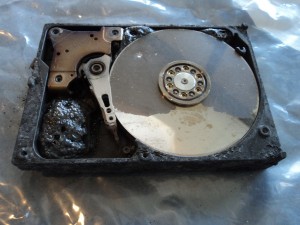Hard disk drives (HDDs) can function in a fairly wide range of conditions, but high operating temperatures can lead to mechanical issues.
Generally, manufacturers recommend that hard drives operate within a range of 77-133 degrees Fahrenheit (25-45 degrees Celsius). Your computer might not immediately notify you if you’ve exceeded this range, but you’ll gradually notice performance issues, which will eventually lead to data loss.
Here’s the good news: Overheating can cause hard drive failure, but in the vast majority of scenarios, our engineers can fully recover data from physically damaged HDDs.
Even so, it’s important to understand how an overheating hard drive could eventually cause data loss — and take appropriate steps to prevent a disaster.
Symptoms of an Overheating Hard Drive
Below, we’ll discuss a few of the most common symptoms of overheating. If you’ve lost data due to a hard drive failure, schedule a free evaluation online or call 1-800-237-4200 to speak with an expert.
1. Performance Issues: Slow Booting, Slow Loading
Hard drives have mechanical components, and those components are rated for a certain range of operating temperatures.
Above those temperatures, metal expands too much — and hard drive actuator heads may have trouble finding the correct position on the platters (discs coated with a thin magnetic material that stores your data).
As the hard drive struggles to find data, performance slows considerably. This can happen when your computer boots, but it’s more likely to occur after the computer operates for a while: The longer the device runs, the hotter it gets.
2. Strange Noises: Clicking, Whirring, and Grinding Sounds
Excessive heat can cause the platters of a hard drive to warp. That warping isn’t visible unless the heat is extreme — below, we’ve included a photo of a fire-damaged hard drive, which isn’t visibly warped (though the warping is certainly there).

Platters of a burned hard drive.
When the distortion is severe, hard drive read/write heads may come into contact with the platters. This causes a head crash, which might result in clicking, whirring, or grinding sounds.
Any noticeable noise is a serious physical symptom. If your hard drive makes unusual noises, turn it off immediately and contact a qualified data recovery provider.
3. File Corruption and Bad Sectors
Excessive heat can cause the surface of the platters to degrade or warp, leading to the creation of bad sectors. Bad sectors are areas on the disk that become unreadable or unreliable.
Bad sectors manifest as file errors, data loss, or a significant drop in overall system performance.
Why do hard drives overheat?
Hard drives can overheat for a variety of reasons, but most often, it’s a combination of high ambient temperatures and improper (or impaired) cooling mechanisms.
Some common causes of overheating include:
- Poor operating conditions. Desktop computers should be placed a significant distance away from walls to allow heat to dissipate through the computer’s fans. If you place your computer right up against the wall, there’s no place for the heat to go — except back into the computer.
- Dust-covered exhaust fans. Dust and other contaminants can compromise your computer’s fans, reducing its ability to operate in high ambient temperatures.
- Aging hardware. As hard drives age, their internal components may become less efficient at dissipating heat.
- High workloads. Intensive tasks like gaming, video editing, or running virtual machines can cause the hard drive to operate continuously, generating more heat.
If you believe that your hard drive is overheating, turn your computer off right away. Check for obstructions in the cooling fans; if you find excessive dust (or anything else), follow the manufacturer’s instructions to clean them.
If your hard drive is still operating normally, make a backup of important files. However, if the drive shows signs of physical damage (such as clicking sounds), keep it powered off. Running a damaged hard drive — even for a few seconds — can cause permanent data loss.
Datarecovery.com provides risk-free evaluations, and we support our services with a no data, no charge guarantee: If we’re unable to recover your files, you don’t pay for the attempt.
Call 1-800-237-4200 to get started or schedule a free evaluation online.





